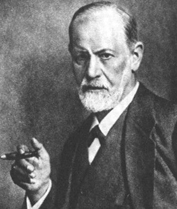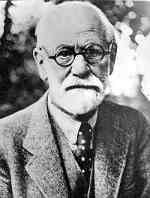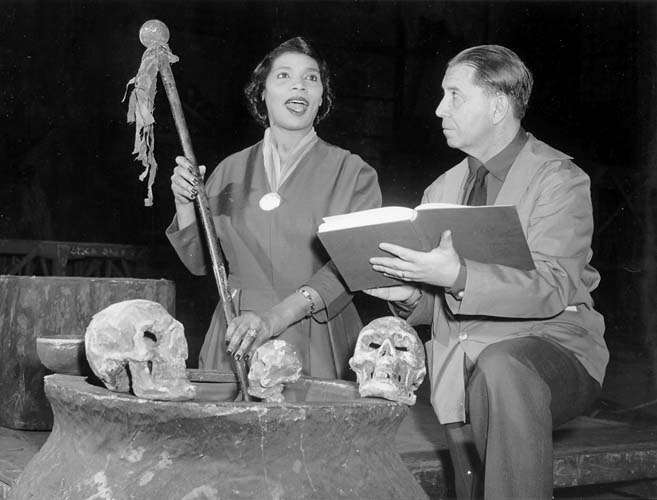A web site full of stuff that should be useful
| AS Psychology |
| Core Studies |
| Links |
| Course Content |
| Exam Questions |
| Psychological Investigation |
| Forum |
| Glossary |
| About this site |
|
|
![]()
The
Freud Page
|
Below is a very brief summary of the Freud study. You will need to use the more detailed summary here to revise for the exam. You can also find all of the past exam questions on Freud's study here.
Here are some comprehension questions There are some interactive quizzes too. Here is a multiple choice quiz and here is a cross-word. This is a very easy jumbled up quiz.
A
patient says, “Doctor, last night I made a Freudian slip, I was having
dinner with my mother-in-law and wanted to say: ‘Could you please pass
the butter?’ “But instead I said: ‘You silly cow, you have completely
ruined my life.’“ |

The Freud Museum in London is an excellent site to start finding out more about Freud. However, if you don't like Sigmund, here's your chance to whack Freud - many times.
|
|
The aim of the case study was to report the findings of the treatment of a five-year-old boy for his phobia of horses. Freud was attempting to demonstrate that the boys (Little Hans) fear of horses was related to his Oedipus complex. Freud thought that, during the phallic stage (approximately between 3 and 6 years old), a boy develops an intense sexual love for his mothers. Because of this, he sees his father as a rival, and wants to get rid of him. The father, however, is far bigger and more powerful than the young boy, and so the child develops a fear that, seeing him as a rival, his father will castrate him. Because it is impossible to live with the continual castration-threat anxiety provided by this conflict, the young boy develops a mechanism for coping with it, using a defence mechanism known as 'identification with the aggressor'. He stresses all the ways that he is similar to his father, adopting his father's attitudes, mannerisms and actions, feeling that if his father sees him as similar, he will not feel hostile towards him. Freud used a case study method to investigate Little Hans’ phobia. However the case study was actually carried out by the boy’s father who was a friend and supporter of Freud. Freud probably only met the boy once. The father reported to Freud via correspondence and Freud gave directions as how to deal with the situation based on his interpretations of the father’s reports. Freud noted that it was the special relationship between Hans and his father that allowed the analysis to progress and for the discussions with the boy to be so detailed and so intimate. The first reports of Hans are when he was 3 years old. The first reports of Hans are when he was 3 years old when he developed an active interest in his ‘widdler’ (penis), and also those of other people. For example on one occasion he asked ‘Mummy, have you got a widdler too?’ Throughout this time, the main theme of his fantasies and dreams was widdlers and widdling. When he was about three years and six months old his mother told him not to touch his widdler or else she would call the doctor to come and cut it off. When Hans was almost 5, Hans’ father wrote to Freud explaining his concerns about Hans. He described the main problem as follows: ‘He is afraid a horse will bite him in the street, and this fear seems somehow connected with his having been frightened by a large penis’. The father went on to provide Freud with extensive details of conversations with Hans. Together, Freud and the father tried to understand what the boy was experiencing and undertook to resolve his phobia of horses. Hans’ anxieties and phobia continued and he was afraid to go out of the house because of his phobia of horses. Hans told his father of a dream/fantasy which his father summarised as follows: ‘In the night there was a big giraffe in the room and a crumpled one: and the big one called out because I took the crumpled one away from it. Then it stopped calling out: and I sat down on top of the crumpled one’. Freud and the father interpreted the dream/fantasy as being a reworking of the morning exchanges in the parental bed. Hans enjoyed getting into his parents bed in a morning but his father often objected (the big giraffe calling out because he had taken the crumpled giraffe - mother - away). Both Freud and the father believed that the long neck of the giraffe was a symbol for the large adult penis. However Hans rejected this idea. When Hans was taken to see Freud, he was asked about the horses he had a phobia of. Hans noted that he didn’t like horses with black bits around the mouth. Freud believed that the horse was a symbol for his father, and the black bits were a moustache. After the interview, the father recorded an exchange with Hans where the boy said ‘Daddy don’t trot away from me!’; Hans' became particularly frightened about horses falling over. He described to his father an incident where he witnessed this happening (later confirmed by his mother). Throughout this analysis the parents continued to record enormous examples of conversations and the father asked many leading questions to help the boy discover the root of his fear. For example: Father: When the horse fell down did you think of your daddy? Hans: Perhaps. Yes. It’s possible. Hans’ fear of the horses started to decline and Freud believed that two final fantasies marked a change in Hans and lead to a resolution of his conflicts and anxieties. Firstly, Hans had described a fantasy where he was married to his mother and was playing with his own children. In this fantasy he had promoted his father to the role of grandfather. In the second fantasy, he described how a plumber came and first removed his bottom and widdler and then gave him another one of each, but larger. At age 19 the not so Little Hans appeared at Freud’s consulting room having read his case history. Hans confirmed that he had suffered no troubles during adolescence and that he was fit and well. He could not remember the discussions with his father, and described how when he read his case history it ‘came to him as something unknown’ Freud believed that the findings from the case study of Little Hans supported his theories of child development. In particular, the case study provided support for his theory of Oedipus Complex in which the young boy develops an intense sexual love for his mother and because of this, he sees his father as a rival and wants to get rid of him. Freud believed that much of Hans’ problem came from the conflict caused by this wish. The final fantasy of being married to his mother supported this idea. According to Freud the cause of Little Hans’ phobia was related to his Oedipus complex. Little Hans’, it was argued, was afraid of horses because the horse was a symbol for his father. For example the black bits around the horses face reminded the boy of his father’s moustache, the blinkers reminded him of his fathers glasses and so on. Freud believed that as Little Hans was having sexual fantasies about his mother he feared his father’s retaliation. Little Hans therefore displaced his fear of his father onto horses who reminded him of his father.
|
|

